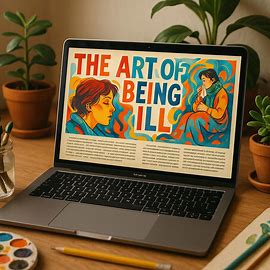Introduction
Illness is often seen as purely physical — a virus to fight, a diagnosis to manage, a wound to treat. Yet behind every illness lies a psychological journey just as important as the medical one. The way people respond emotionally, mentally, and socially to illness can determine not only their recovery but also their overall well-being.
The art of being ill is less about sickness itself and more about how one navigates the psychological terrain that comes with it. From identity shifts to coping strategies, illness has the power to reshape how we view ourselves, others, and the world.
The Mind-Body Connection
Modern psychology recognizes what many ancient traditions have always known: the mind and body are deeply intertwined. Stress weakens immunity, loneliness worsens health outcomes, and a positive mindset can aid recovery.
When illness strikes, it’s not just the body that suffers — the mind enters a battle of its own. Fear, uncertainty, and loss of control can intensify symptoms, creating a cycle of distress. Learning the art of being ill involves understanding this mind-body connection and using psychological tools to support healing.
Identity and the “Sick Role”
Sociologist Talcott Parsons introduced the concept of the “sick role” — the idea that society assigns special expectations to those who are ill. On one hand, the sick are excused from normal duties, but on the other, they are expected to seek treatment and aim for recovery.
This duality can create internal conflict. Who am I if I cannot perform my usual roles? Am I still valuable if I am dependent on others? The art of being ill requires navigating these identity questions with self-compassion. Illness does not erase worth — it simply shifts the focus of identity from doing to being.
Coping Mechanisms: Adaptive vs. Maladaptive
Psychologists categorize coping strategies as adaptive (healthy) or maladaptive (unhealthy). During illness, both kinds can appear:
- Adaptive coping: Mindfulness, journaling, therapy, seeking social support.
- Maladaptive coping: Denial, substance abuse, withdrawal, self-blame.
The art of being ill lies in recognizing when coping mechanisms hinder rather than help. Adaptive strategies don’t just reduce stress; they strengthen resilience and improve overall well-being, even in chronic conditions.
The Role of Uncertainty
Illness often comes with uncertainty — about diagnosis, treatment, recovery, or long-term impact. Human beings naturally resist uncertainty, but psychologists note that learning to tolerate it is crucial for mental health.
The art of being ill involves making peace with uncertainty. This doesn’t mean giving up hope; it means learning to live fully even when answers are incomplete.
Emotional Stages of Illness
Much like grief, illness can bring emotional stages:
- Denial – “This can’t be happening to me.”
- Anger – Frustration at limitations or unfairness.
- Bargaining – Hoping for a quick fix in exchange for lifestyle changes.
- Depression – Mourning lost health or independence.
- Acceptance – Finding peace and adapting to new realities.
Not everyone moves linearly through these stages, but recognizing them helps normalize the emotional journey. The art of being ill means allowing space for these emotions without shame.
The Healing Power of Social Support
Psychological research consistently shows that social support improves health outcomes. People who feel connected to others recover faster, manage pain better, and experience less depression during illness.
The art of being ill reminds us that asking for help is not a burden. Vulnerability creates bonds, and illness can strengthen relationships when openness replaces pride.
Illness as a Mirror of Priorities
When illness slows you down, it forces reflection: What really matters? Are my current priorities aligned with my values? Many people emerge from illness with new clarity about what they want from life.
The art of being ill is learning to use this mirror wisely. Instead of rushing back into old patterns, you integrate the lessons illness revealed — choosing presence over pressure, balance over burnout.
Post-Traumatic Growth and Resilience
Psychology recognizes a phenomenon called post-traumatic growth — positive transformation following hardship. Illness, though painful, can lead to:
- Greater appreciation for life.
- Stronger personal relationships.
- Increased spiritual or philosophical depth.
- New possibilities and goals.
- A stronger sense of personal strength.
The art of being ill is embracing the possibility that struggle can lead to growth, not just loss.
Practical Psychological Tools for Navigating Illness
- Mindfulness meditation: Helps calm the nervous system and reduce anxiety.
- Cognitive reframing: Replaces negative self-talk with balanced perspectives.
- Expressive writing: Journaling emotions reduces stress and increases clarity.
- Therapeutic support: Talking with a professional offers structured coping strategies.
- Visualization techniques: Guided imagery can enhance relaxation and healing.
These tools strengthen mental resilience and ease the psychological burden of illness.
Conclusion
Illness changes more than the body — it transforms the mind, reshapes identity, and redefines priorities. By exploring the psychological side of sickness, we learn that healing is not just medical but also emotional, social, and spiritual.
The art of being ill is a practice of self-awareness, acceptance, and growth. It is about facing vulnerability with courage, using coping tools wisely, and allowing illness to become a teacher rather than just an obstacle. In this way, even life’s most difficult moments can offer meaning, depth, and transformation.
